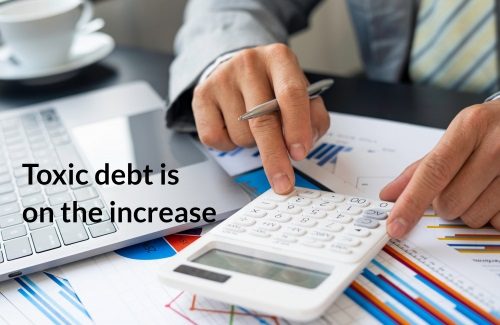Toxic Debt now affects 52% of UK Businesses
Despite the huge Government Coronavirus support package for UK Businesses, corporate debt has increased to £6.6 trillion
The Government’s Coronavirus support packages for UK companies undoubtedly helped many thousands of businesses survive as the Pandemic rumbled on into a third lockdown and beyond. But for many businesses, especially in the worst hit sectors, such as travel and hospitality, the lost income cannot be replaced quickly or easily, and new research now shows that as total UK corporate debt has climbed to £6.6 trillion, 52% of UK businesses have toxic debts, including Government Loans that are now due, that may never be repaid. This could have serious repercussions and is already contributing to a rise in Insolvencies.
Latest Insolvency Service Figures
Insolvencies are on the increase in the UK. The latest Insolvency Service figures for September 2020 showed that there were 1,446 company insolvencies in the UK, an increase of 100 from August 2020 and a 56 per cent increase on September 2020.
As repayments on Government loans become due, as well as other debts needing to be repaid, the likelihood is that many businesses are only just beginning to assess whether they can afford these repayments. If they cannot, we can expect to see a further acceleration in insolvencies.
Antony Batty, Licensed Insolvency Practitioner, states:
“At a local level Antony Batty & Co have seen a rise in the number of appointments in the last few weeks and would stress that the sooner we speak to companies who are unable to meet commitments such as their Bounce Back Loans the more options there are available.”
Increased Creditor Action
Creditor action against businesses that owe them money is likely to increase as Courts have now reopened post pandemic. As has been pointed out, Creditors are unlikely to wait any longer for payments now, as if they do not get paid, then they too become indebted, and the cycle continues. Likewise, it is anticipated by many commentators that HMRC will also begin pursuing debts after a year of deferred tax payments now that business support schemes have finished
The Bank of England has also recently warned about the potential for a wave of insolvencies as debts are due and Government support ends:
“The increase in debt, though moderate in aggregate, has likely led to increases in the number and scale of more vulnerable businesses. As the economy recovers and government support, including restrictions on winding-up orders, falls away, business insolvencies are expected to increase from historically low levels.”
What can affected businesses do?
These figures are extremely concerning, especially for the worse hit sectors, where, for example, 66% of businesses in the Hotels and Accommodation sector and 65% of Bars and Restaurants are now thought unlikely to be able to pay their current liabilities over the next 12 months.
As Insolvency Practitioners, our advice is always to seek professional help sooner, rather than later. When financially distressed companies approach us, our first aim is always to see if we can restructure and revive a business, using a Company Voluntary Arrangement or an Administration.
Indeed, as Antony Batty commented at the start of the Pandemic:
“One solution we have in our armoury, as Insolvency Practitioners is a Company Voluntary Arrangement. We believe CVA’s could enable Companies to survive, by effectively “mothballing” them until better times return.”
Two key points about CVAs are:
- Suppliers and employees will be bound by the CVA but will get the best prospect of recovering their losses if the Company still exists and can be quickly kick-started once business returns.
- The CVA would seek to repay creditors and employees out of future profits, in the meantime employees can claim arrears of pay, redundancy and other benefits from the Government which will remove the short-term burden on the Company.
However, for many businesses, the only realistic outcome will be a Creditors’ Voluntary Liquidation, where our role is to ensure as orderly and stress free a process as possible.
Talk to us if facing insolvency
If your company is struggling to pay its debts and is facing insolvency, the sooner you talk to us the better.
Please contact us or call any of our offices, below, for a FREE initial discussion on the ‘phone or over a coffee.
